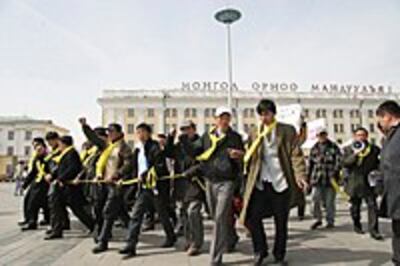
ULAN BATAAR, Mongolia—Mongolian opposition forces, angered by chronic poverty and corruption and inspired by the March “velvet revolution” in nearby Kyrgyzstan, are stepping up protests and demanding that the government resign.
On April 7, more than 2,000 supporters of the reformist Civil Movement for a Just Society marched through the capital of this vast, sparsely populated country calling on the government to step down and vowing to hold a Peoples’ Assembly as an alternative to the 76-seat Parliament.
The protesters ignored repeated warnings from police, marching through central Sukhbaatar Square and threatening to break into Government House—chanting “Stop corruption!” and “Government, step down!”
”We gave the authorities one month to fulfill their promises,” J. Batzandan, a Hungarian-trained lawyer and a leader of the opposition Civil Movement for a Just Society, told RFA.
“The national wealth is concentrated in the hands of few while the majority live in poverty. Human rights are routinely violated and the society [is moving] toward oligarchy,” Batzandan said. “All these are signs of an unhealthy society, and we must seek ways to aid it—just as civic movements in Central Europe, free of political and economic interests, did in their countries in the 1960s and 90s.”
On March 25, about 3,000 demonstrators pushed past police and gathered on Sukhbaatar Square. Some chanted congratulations to Kyrgyz protesters, who forced their own premier, Askar Akayev, to step down March 24.
Premier urges calm

With general elections set for May 22, Mongolian Prime Minister Elbegdorj Tsakhia is urging calm even as street protests escalate. “Criticism of government is not necessarily bad,” he told Parliament last week. “The very fact that people can voice out their opinions is an important achievement of democracy in this country.”
Mongolia has taken a less heavy-handed approach to political reform than its Kyrgyz neighbors.
The current prime minister, Elbegdorj, himself led rallies aimed at overthrowing seven decades of communist rule in the early 1990s. He received protesters earlier this month by urging them to come with constructive proposals rather than only criticism.
The deputy speaker of Parliament has also received the movement’s leaders, informing them that their demands would be discussed by MPs.
“This was an important victory for us. Before those in power simply refused to listen, but now they are willing to talk,” J. Batzandan said.
Wave of civil protests
These latest rallies follow more than a dozen demonstrations held since the new coalition government was formed in August 2004.
Students, pensioners, and mining workers have been among those taking to the streets.
“People have become increasingly dissatisfied with the failure of the major political parties to deliver their election promises,” political analyst L. Erdenetuul said. “And this movement only reflects widespread frustration in society.”
Leading the charge for reform is a group of young, Western-educated Mongolians—including three young lawyers who formed the Civil Movement for a Just Society in February.
They want investigations of alleged corruption by government officials including former prime minister N. Enkhbayar, as well as broader press freedom and the right to gather in Sukhbaatar Square.
Critics accuse Enkhbayar, now parliamentary speaker, and other officials of embezzling 3.5 billion tugruk (U.S. $3 million) from public funds. Police say they found no grounds to charge any of the officials.
“With six weeks to go before the presidential election and stiff competition, none of four candidates now can ignore this issue [corruption],” Erdenetuul said.
Progress or widespread trouble?
The protesters’ main complaint is that the Democracy-Motherland coalition of three opposition parties has failed to address unemployment, poverty, and corruption.
Last year the opposition made a surprising comeback by pledging to end authoritarian government, which they say has persisted despite Mongolia’s transition away from Soviet-style communism since 1990.
Mongolia has moved rapidly and peacefully from a centrally planned economy and totalitarian, one-party political system to a market economy and democracy since then.
But its authoritarian legacy remains, critics say, while democratic achievements are fragile, and the economic growth has stagnated. Unemployment stands at nearly 20 percent, and more than 120,000 Mongolians have emigrated since 1990 in search of a better life.
Vulnerable economy, plenty of corruption
While the country’s U.S.$ 1.2 billion economy grew by 10.6 percent last year, the growth failed to trickle down to the broader population.
One out of three Mongolians now lives below the poverty line, on less than U.S. $1 a day. Mongolia’s U.S. $ 477 per capita annual income ranks it among chronically impoverished Bangladesh, Sudan, Laos, and Georgia.
Mongolia's economy depends excessively on exploitation of natural resources, whose world prices fluctuate dramatically. These include copper, gold, and cashmere. From 2000-2002, natural disasters such as repeated dzuds (blizzards) killed off one-third of the country's livestock.
Critics further allege that corruption and abuse of power by elected officials remains rampant. A survey by Transparency International showed that 48.8 percent of the public believes corruption is pervasive in Mongolia. The survey also revealed poor public accountability and too much power in the hands of bureaucrats as the major causes of corruption.
Another survey in 2004 by the Mongolian Chamber of Commerce and Industry found that more than 70 percent of businesses surveyed admitted paying bribes to operate normally.
‘Systemic crisis’ or sign of progress?
”We are talking about a systemic crisis. The current political structures simply are not adequate to solve these problems,” D. Ganhuyag, a political analyst, said.
Layton Croft, Mongolia country director for the U.S.-based Asia Foundation, disagrees. “Civil society in Mongolia is evolving in a positive way, with more and more voluntary civic groups concerned with economic livelihood, environmental degradation, and quality of government services,” Croft said.
Original reporting in Mongolian and English by Lutaa Badamkhand in Ulan Bataar. Edited and produced for the Web by Luisetta Mudie and Sarah Jackson-Han.
